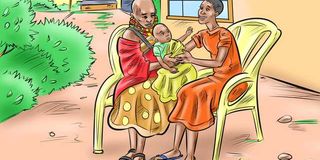Allow teen mums back to school

What you need to know:
- In our cover story this week, we bring you the story of Maasai mothers who are breaking cultural norms and challenging the practice of teen marriages.
- They are empowering their daughters who become teen mothers to pursue education instead.
Teenage pregnancy is an impediment to the educational success of girls, especially in sub-Saharan Africa.
Many teen mums have to contend with the challenges of early motherhood, ranging from their newfound childcare responsibilities, to lack of emotional support, and stigma from the community. The problem is more pronounced among girls from marginalised communities.
The United Nations Population Fund (UNFPA), says sub-Saharan Africa has the highest rates of teen pregnancy globally. In Kenya, the rates remain high, with close to 20 per cent of girls aged 15 to 19 either pregnant, or already teen mothers. The National Council for Population and Development reports that about 13,000 girls drop out of school annually to give birth.
Several African countries have implemented programmes to support teen mothers in returning to school. In Kenya, the 1994 school re-entry policy for young mothers requires school heads and teachers to unconditionally readmit them to school.
Despite the policy provision, however, critics point to low parental involvement and support, among other issues. In Tanzania, too, the re-entry policy allows pregnant girls and young mothers to continue their education after giving birth.
Adolescent mothers need support, given their limited knowledge of motherhood and limited financial abilities. Most of them wish to go back to school but face hindrances, including lack of school fees, lack of childcare support and harmful cultural practices and beliefs.
Sometimes they are married off to older men or sent to major towns to work as domestic workers, reducing their probability of completing school.
Research shows that when teen mothers complete their education, it can cushion them and their children against negative long-term outcomes. It provides them with a vital opportunity to break the cycle of poverty and improve their life prospects. And even though these girls may get a chance to go back to school, they may not achieve academic success if they don’t get sufficient support.
During the Covid-19 lockdown in Kenya, 152,000 teenage girls got pregnant, according to Global Citizen. A Kenya Health Information System survey found that 3,964 girls under the age of 19 were pregnant in Machakos County alone! I always wonder where these girls are. Did they ever go back to school? If not, where are they?
In our cover story this week, we bring you the story of Maasai mothers who are breaking cultural norms and challenging the practice of teen marriages. They are empowering their daughters who become teen mothers to pursue education instead. This shift defies long-held traditions that perpetuated early marriages and limited opportunities for girls. Their efforts signify a key step towards gender equality and women’s empowerment within the Maasai community.
Blessed weekend.





